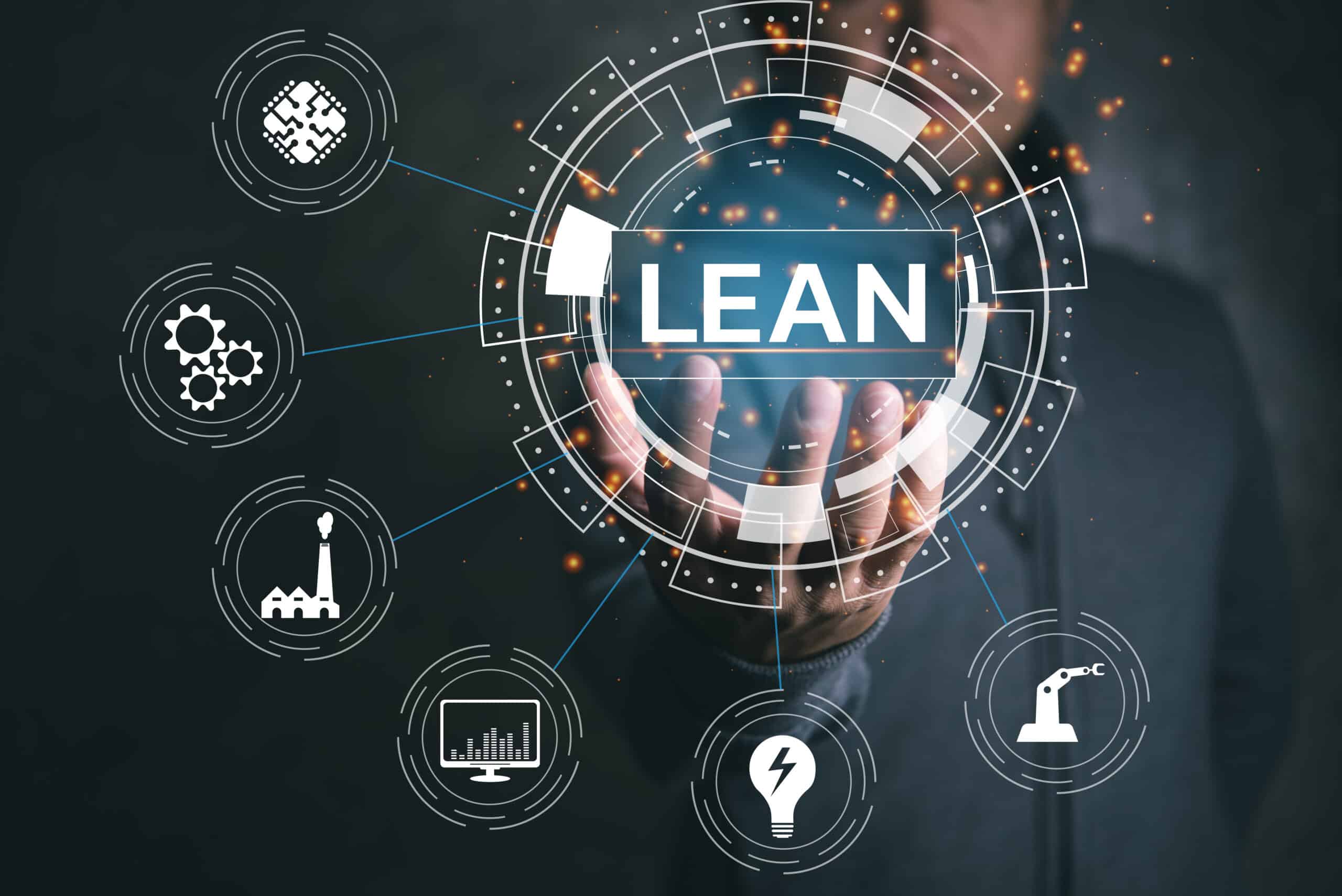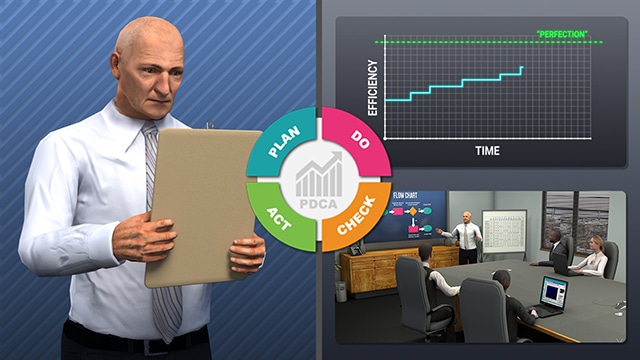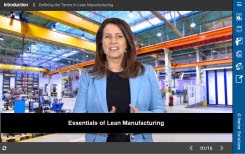April 3, 2024 9 min read

From Concept to Execution: Lean Manufacturing Training Essentials
Industry:
Solution:

For manufacturers, achieving operational excellence is paramount. Despite this goal, a recent study reveals a significant gap in translating data into actionable insights; fewer than 5% of manufacturing plant data is transformed into any actionable insight. Now, more manufacturers are calling for answers to scale operational value at their sites. Lean manufacturing has emerged as a strategic approach that offers a systematic methodology to streamline processes and eliminate waste. However, the journey towards Lean success hinges not only on theory but also on practical skills and in-depth understanding. In this comprehensive article, we’ll explore the essentials of lean manufacturing training, overview its concepts, methodologies, and how effective training can bridge the gap between theory and execution, ultimately driving sustainable enhancements for manufacturing operations.
Understanding Lean Manufacturing
Lean manufacturing tools or techniques are a philosophy that emphasizes continuous improvement, waste reduction, and value creation for customers.
Lean Manufacturing: Continuous Improvement and the PDCA Cycle
This course defines the phases of PDCA, explain how to use it as a continual improvement procedure, and list the benefits of implementing PDCA into your processes.
View Course
Originating from the Toyota Motor Company, lean principles aim to maximize efficiency while minimizing resources, time, and effort. Central to lean principles is the identification and elimination of various forms of 7 wastes of lean manufacturing, known as “muda,” including overproduction, defects, waiting, unnecessary inventory, excess motion, transportation, and underutilized talent.
- Overproduction occurs when something is produced in excess, ahead of schedule, or faster than the subsequent process requires.
- Defects can arise from various sources, such as errors in production processes, faulty equipment, or inadequate quality control measures.
- Waiting waste occurs when equipment, materials, or personnel are idle due to bottlenecks, equipment breakdowns, or scheduling inefficiencies. For example, if a production line is halted because one workstation is waiting for components from another workstation, valuable time and resources are wasted. Similarly, if operators are idle due to a lack of clear instructions or materials, it can lead to decreased productivity and increased lead times.
- Unnecessary inventory waste occurs when excess raw materials, work-in-progress (WIP), or finished goods are stored beyond what is required for immediate production or customer demand.
- Excess motion waste often results from inefficient workspace design, leading to unnecessary walking.
- Transportation waste is when materials or products are moved unnecessarily between processes or locations. For instance, excessive handling of components between workstations or transferring goods between warehouses can lead to delays, increased handling costs, and potential damage to the products.
- Underutilizing staff extends beyond time management to include failing to tap into their knowledge and creativity, often exacerbated by hierarchical structures and a lack of teamwork.
These categories of 7 wastes of lean manufacturing underscore the importance of optimizing processes and resources to maximize efficiency and minimize waste throughout manufacturing operations. Building on this understanding, the foundational pillars of lean manufacturing provide a structured approach to achieving operational excellence.
Essentials of Lean Manufacturing
This interactive online course will provide you with a simplistic approach to Lean Manufacturing, promote a mindset change, and share the tools needed to implement value-creation processes with minimum waste.
View Course
The Pillars of Lean
At its core, lean manufacturing rests on five foundational pillars:
- Identifying Value: Value is defined from the customer’s perspective. Anything that does not contribute to this perceived value is considered waste and should be eliminated.
- Mapping the Value Stream: Understanding the end-to-end process flow, from raw materials to the delivery of the final product, is crucial for identifying areas of improvement and waste elimination.
- Creating Flow: Once the value stream is mapped, efforts are made to establish a continuous flow of work, minimizing interruptions, delays, and bottlenecks.
- Establishing Pull: Production is driven by customer demand rather than pushing inventory through the system. This ensures that products are made only as needed, reducing overproduction and excess inventory.
- Seeking Perfection: Lean is a journey of continuous improvement. With a focus on a Plan-Do-Check-Act (PDCA) cycle, there’s always room for enhancements, and the pursuit of perfection is ongoing, driven by a culture of improvement.

The Importance of Lean Manufacturing Training
While lean principles may seem straightforward in theory, successfully implementing them within a manufacturing environment requires a deep understanding of the methodologies and techniques involved. This is where effective lean manufacturing training comes into play.
Cultivating a Lean Culture
Training programs equip employees with the necessary skills and foster a culture of continuous improvement. When employees understand lean principles and methodologies, they become actively engaged in identifying and eliminating waste, driving efficiency, and contributing to the overall success of the organization.
Improving Operational Efficiency
By providing employees with lean manufacturing tools and techniques to streamline processes and eliminate waste, lean manufacturing training equips employees with tools and techniques to streamline processes and eliminate waste effectively.
Moreover, leveraging an Learning Management Systems (LMS) and eLearning created for the industrial manufacturing workforce can enhance accessibility and scalability of training initiatives. Employees can access training materials at their convenience, allowing for continuous learning and skill development. By integrating LMS and online training into lean manufacturing programs, organizations can ensure that employees are equipped with the skills needed to drive operational efficiency, leading to reduced lead times, lower production costs, increased productivity, and ultimately, greater profitability.
Enhancing Problem-Solving Skills
Lean manufacturing training encourages employees to adopt a problem-solving mindset. Through techniques such as root cause analysis, value stream mapping, and Kaizen events, employees learn how to identify and address issues at their root, rather than merely treating symptoms. This results in more sustainable solutions and a proactive approach to problem-solving.
Empowering Continuous Improvement
Continuous improvement is at the heart of lean manufacturing. Training programs empower employees at all levels to actively participate in the improvement process, generating ideas for enhancement, implementing changes, and measuring results.
This cycle of continuous improvement ensures that the organization remains agile and responsive to changing market conditions and customer needs. From production line workers to quality assurance specialists, each role across a manufacturing plant contributes unique insights and expertise to the continuous improvement journey.
- Production operators, for instance, are on the frontline of manufacturing operations, possessing invaluable insights into daily workflow challenges and opportunities for optimization. Through targeted training, operators learn to identify waste, suggest process improvements, and implement changes directly on the production floor.
- Quality assurance specialists ensure product quality and customer satisfaction. Training programs for these professionals focus on advanced quality management techniques, statistical process control, and root cause analysis. By applying lean methodologies, they can identify defects early in the production process, implement corrective actions, and prevent recurrence, ultimately driving improvements in product quality and reliability.
- Maintenance technicians should receive training in Total Productive Maintenance (TPM) to optimize equipment performance and minimize downtime. By proactively addressing equipment reliability issues and conducting preventive maintenance activities, they contribute to the smooth operation of production lines and support continuous improvement efforts.
- Engineers and process improvement specialists are tasked with leading larger-scale improvement initiatives and driving organizational change. Training programs for these roles emphasize leadership development, change management strategies, and advanced lean manufacturing tools such as value stream mapping and kaizen events.
Tailoring Lean Manufacturing Training to Organizational Needs
While the guidance above provides a solid foundation for the value of lean training, it’s essential to tailor the curriculum to the specific needs and challenges of your organization. Conducting a thorough training needs analysis and employee competency assessment can help identify gaps and prioritize areas for improvement.
Unlock your workforce’s potential with our innovative Vector LMS Competency Assessment tool, empowering manufacturing leaders to gauge employee proficiency and drive targeted training initiatives for enhanced performance. Explore how our tool can revolutionize your training efforts.
To ensure effective implementation of Lean Manufacturing principles, it’s essential to assess key areas and provide comprehensive training for employees.
Here are the lean manufacturing training aspects to focus on:
1. Lean Fundamentals:
- Provide an overview of Lean philosophy, its historical context, and core concepts.
- Emphasize the importance of customer value and understanding waste within manufacturing processes.
2. 5S System Lean Manufacturing Methodology:
- Introduce practical strategies for workplace organization, including Sort, Set in Order, Shine, Standardize, and Sustain.
- Demonstrate how proper implementation of 5S system lean manufacturing principles enhances efficiency and workplace safety.
3. Kaizen Workshops:
- Develop facilitation skills necessary for leading Kaizen events effectively.
- Encourage participation and collaboration among employees in identifying and implementing improvements.

4. Pull Systems:
- Explain the principles behind pull systems and their role in minimizing waste and optimizing production.
- Provide practical guidance on implementing and using pull systems such as Kanban.
5. Total Productive Maintenance (TPM):
- Offer strategies for ensuring equipment reliability and maintenance to minimize downtime.
- Involve operators in understanding and measuring Overall Equipment Effectiveness (OEE) to drive continuous improvement.
6. Quality Management:
- Teach employees how to implement effective quality control and assurance measures.
- Provide tools and techniques for maintaining and improving product quality throughout the manufacturing process.
7. Coaching and Mentoring for Leaders:
- Equip leaders with coaching and on-the-job (OJT) mentoring skills to support the establishment of a culture of continuous improvement.
- Provide guidance on navigating change management and fostering employee engagement in Lean initiatives.
By addressing these key areas through targeted training, industrial manufacturers can empower their employees to embrace lean principles and actively contribute to the continuous improvement journey. Further, creating role-specific learning paths offer a structured guide for skill enhancement and enable individuals to methodically gain the knowledge and expertise essential for thriving in their roles within the Lean environment.
The Importance of Ongoing Lean Manufacturing Learning
Lean principles offer a pathway to operational excellence and sustainable growth. By investing in comprehensive training programs covering essential Lean topics and practical applications, organizations can empower their employees to drive continuous improvement. Remember, Lean is not just a methodology—it’s a journey of transformation and innovation that is essential for manufacturers.
Equip your workforce with the knowledge and skills needed to navigate the lean landscape and unlock the full potential of your organization. Connect with one of our experts today to learn more about Vector Solutions’ online courses and training management solutions and how the solutions support lean manufacturing goals of streamlined processes, minimizing waste, and ultimately enhancing productivity.








